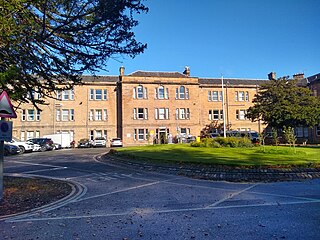Related Research Articles

Charles Kirk Clarke was a psychiatrist who was influential in Canadian politics.

Rajendra 'Raj' Persaud FRCPsych is an English consultant psychiatrist, broadcaster and author of books about psychiatry. He is known for raising public awareness of psychiatric and mental health issues in the general media, has published five books and received numerous awards.

The Royal Edinburgh Hospital is a psychiatric hospital in Morningside Place, Edinburgh, Scotland. It is managed by NHS Lothian.

Claybury Hospital was a psychiatric hospital in Woodford Bridge, London. It was built to a design by the English architect George Thomas Hine who was a prolific Victorian architect of hospital buildings. It was opened in 1893 making it the Fifth Middlesex County Asylum. Historic England identified the hospital as being "the most important asylum built in England after 1875".

John Ercel Fryer, M.D. was an American psychiatrist and gay rights activist best known for his anonymous speech at the 1972 American Psychiatric Association (APA) annual conference, where he appeared in disguise and under the name Dr. Henry Anonymous. That event has been cited as a key factor in the decision to remove homosexuality as a mental illness from the APA Diagnostic and Statistical Manual of Mental Disorders. The APA "John E. Fryer, M.D., Award" is named in his honor.
John Sanbourne Bockoven was an American psychiatrist. He served as an officer in the U.S. Army Medical Corps of the during World War II.
The Association of Medical Superintendents of American Institutions for the Insane, also known as The Superintendents' Association, was organized in Philadelphia in October, 1844 at a meeting of 13 superintendents, making it the first professional medical specialty organization in the U.S.

The Austen Riggs Center is a psychiatric treatment facility in Stockbridge, Massachusetts. It was founded by Austen Fox Riggs in 1913 as the Stockbridge Institute for the Study and Treatment of Psychoneuroses before being renamed in honor of Austen Riggs on July 21, 1919.
Carl Compton Bell was an American professor of psychiatry and public health at the University of Illinois at Chicago. Bell was a National Institute of Mental Health international researcher, an author of more than 575 books, chapters, and articles addressing issues of violence prevention, HIV prevention, isolated sleep paralysis, misdiagnosis of Manic depressive illness, and children exposed to violence.

Central institute of Psychiatry Ranchi is an institute that is directly governed by the Government of India. It is situated in Kanke, Ranchi in Jharkhand state of India.
Winfred Overholser was an American psychiatrist, president of the American Psychiatric Association, and for 25 years the superintendent of St. Elizabeths Hospital, a federal institution for the mentally ill in Washington, D.C.
Harry C. Solomon (1889–1982), an American neurologist, psychiatrist, researcher, administrator, and clinician, was among the first to advocate for major changes in public psychiatry. He called for the closure of large, public mental hospitals and replaced with community-based facilities.
Daniel Blain, M.D. (1898–1981) was an American physician and was the first medical director of the American Psychiatric Association (APA), the first professional medical society, founded in the United States in 1844. He may be credited with the leadership which brought changes in the practice of psychiatry after World War II and in advocating the treatment for people with mental disorders.
George Alder Blumer, M.D. (1857-1940) was a physician, a mental hospital administrator, and a journal editor. He was a leader in the provision of humanitarian care for mental hospital patients.

David Kennedy Henderson FRSE FRCPE was a Scottish physician and psychiatrist and served as president of the Royal College of Physicians of Edinburgh 1949 to 1951.
The Yangon Psychiatric (Mental) Health Hospital is one of the two major mental health hospitals in Myanmar. The 1,200-bed hospital is located at Ywar Thar Gyi Ward in East Dagon Township. Thus, it was known as Ywar Thar Gyi Psychiatric Hospital in the past.

Zucker Hillside Hospital is a psychiatric facility that opened in 1926, relocated to its present address in 1941, and was renamed in 1999 to its present name.

Mental healthcare in India is a right secured to every person in the country by law. Indian mental health legislation, as per a 2017 study, meets 68% (119/175) of the World Health Organization (WHO) standards laid down in the WHO Checklist of Mental Health Legislation. However, human resources and expertise in the field of mental health in India is significantly low when compared to the population of the country. The allocation of the national healthcare budget to mental health is also low, standing at 0.16%. India's mental health policy was released in 2014.
Ronald Arthur Sandison was a British psychiatrist and psychotherapist. Among his other work. he is particularly noted for his pioneering studies and use of lysergic acid diethylamide (LSD) as a psychotheraputic drug. As a consultant psychiatrist, his LSD work was mainly carried out during the 1950s and '60s at Powick Hospital, a large psychiatric facility near Malvern, Worcestershire, after which he spent several years in Southampton, where he was instrumental in the establishment of the university medical school. He returned to his native Shetland Isles in the 1970s and worked in psychotherapy there. He later specialised in psychosexual medicine on the UK mainland. Sandison died at the age of 94, and was buried in Ledbury near Malvern.
References
- ↑ "Coping with Sexual Abuse". Globe Newswire . 2008-12-26. Retrieved 2009-02-04.
- ↑ "Nat T. Winston Jr. Obituary". Legacy.com . 2014-01-01. Retrieved 2014-01-16.
- ↑ "Psychology Speaker: Dr. Nat T. Winston, Jr". 2014-01-01. Retrieved 2014-01-16.
- ↑ "Johnny Cash—Live". Christianity Today . 2003-09-01. Archived from the original on 2008-07-11. Retrieved 2009-01-09.
- ↑ Edward Willett (July 2010). Johnny Cash: "The Man in Black". ISBN 9780766033863 . Retrieved 2014-01-16.
- ↑ "Raymond Fairchild". Native Ground Books & Music . Archived from the original on 2009-02-14. Retrieved 2009-01-09.